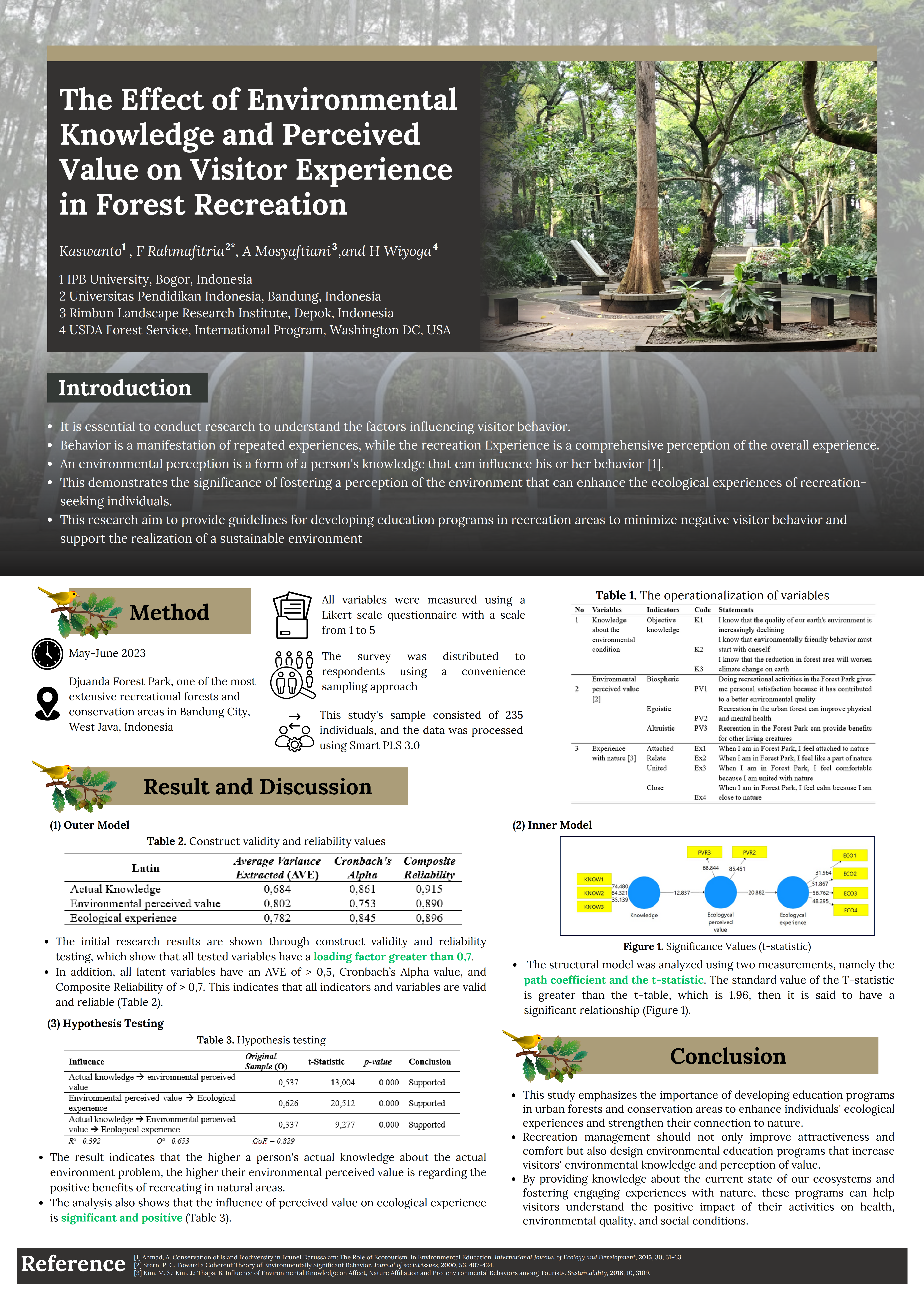The Effect of Environmental Knowledge and Perceived Value on Visitor Experience in Forest Recreation
Abstract
Vandalism and environmental degradation pose challenges in natural recreation areas, prompting the need for interventions to promote environmental consciousness and nature appreciation. This study investigates the role of knowledge and perceived value in enhancing ecological experiences. A five-point Likert scale survey was distributed to 235 visitors at Djuanda Forest Park in Bandung, Indonesia. Structural Equation Modeling (SEM-PLS) was employed to analyze direct and indirect influences. The results demonstrate that enhancing ecological perceived value positively impacts visitors' interactions with nature. Moreover, increased actual knowledge regarding environmental degradation enhances the perceived value of outdoor recreation in natural settings. These findings highlight the importance of developing educational programs in natural recreation areas to support sustainable environmental practices.
References
2. Vicente-Molina, M. A.; Fernández-Sáinz, A.; Izagirre-Olaizola, J. Environmental knowledge and other variables affecting pro-environmental behaviour: comparison of university students from emerging and advanced countries. Journal of Cleaner Production, 2013, 61, 130-138.
3. Castellanos-Verdugo, M.; Vega-Vázquez, M.; Oviedo-García, M. Á.; Orgaz-Agüera, F. The Relevance of Psychological Factors in The Ecotourist Experience Satisfaction through Ecotourist Site Perceived Value. Journal of Cleaner Production, 2016, 124, 226-235.
4. Ahmad, A. Conservation of Island Biodiversity in Brunei Darussalam: The Role of Ecotourism in Environmental Education. International Journal of Ecology & Development, 2015, 30, 51-63.
5. Jamin, A.; Rahmafitria, F.; & Nurazizah, G. R. Rebuilding health tourism destination image after Covid-19: The case of Malaysia And Indonesia. IEEE 8th R10 Humanitarian Technology Conference (R10-HTC), 2020, (pp. 1-6). IEEE.
6. Ajzen, I.; Joyce, N.; Sheikh, S.; Cote, N. G. Knowledge and The Prediction of Behavior: The Role of Information Accuracy in The Theory of Planned Behavior. Basic and applied social psychology, 2011, 33(2), 101-117.
7. Kim, M. S.; Kim, J.; Thapa, B. Influence of Environmental Knowledge on Affect, Nature Affiliation and Pro-Environmental Behaviors among Tourists. Sustainability, 2018, 10(9), 3109.
8. Laroche, M.; Bergeron, J.; Barbaro-Forleo, G. Targeting Consumers Who are Willing to Pay more for Environmentally Friendly Products. J. of Consum. Mark. 2001, 18(6), 503–520.
9. Mobley, C.; Vagias, W.M.; DeWard, S. L. Exploring Additional Determinants of Environmentally Responsible Behaviour: The Influence of Environmental Literature and Environmental Attitudes. Environ. and Behav. 2010, 42(4), 420–447.
10. Kennedy, E.H.; Beckley, T.M.; McFarlane, B. L.; Nadeau, S. Why We Don´t Walk The Talk: Understanding the Environmental Values/Behaviour Gap in Canada. Hum. Ecol. Rev. 2009, 16(2), 151–160.
11. Napitupulu DW, Rahmafitria F, Rosita R. The effect of tourism accessibility perception towards tourists visiting intention to Toba lake in Samosir district. Journal of Indonesian Tourism, Hospitality and Recreation. 2021 Apr;4(1):39-52.
12. Stern, P. C. New Environmental Theories: Toward A Coherent Theory of Environmentally Significant Behavior. Journal of Social Issues, 2000, 56(3), 407-424.
13. Um, S.; Chon, K.; Ro, Y. H. Antecedents of revisit intention. Annals of Tourism Research, 2006, 33(4), 1141-1158.
14. Rahmafitria F, Kaswanto RL. The role of eco-attraction in the intention to conduct low-carbon actions: a study of visitor behavior in urban forests. International Journal of Tourism Cities. 2024 Mar 25.
Authors

This work is licensed under a Creative Commons Attribution 4.0 International License.
Media Konservasi is an open access journal, meaning that all content is freely available without charge to the user or their institution. Users are allowed to read, download, copy, distribute, print, search, or link to the full texts of the articles in this journal without needing to request prior permission from the publisher or the author.
All articles published by Media Konservasi are licensed under the Creative Commons Attribution 4.0 International License. This allows for unrestricted use, distribution, and reproduction in any medium, provided proper credit is given to the original authors.
Authors submitting manuscripts should understand and agree that the copyright of published manuscripts is retained by the authors. Copyright encompasses the exclusive rights of authors to reproduce, distribute, and sell any part of the journal articles in all forms and media. Reproduction of any part of this journal, its storage in databases, and its transmission by any form or media is allowed without written permission from Media Konservasi.







